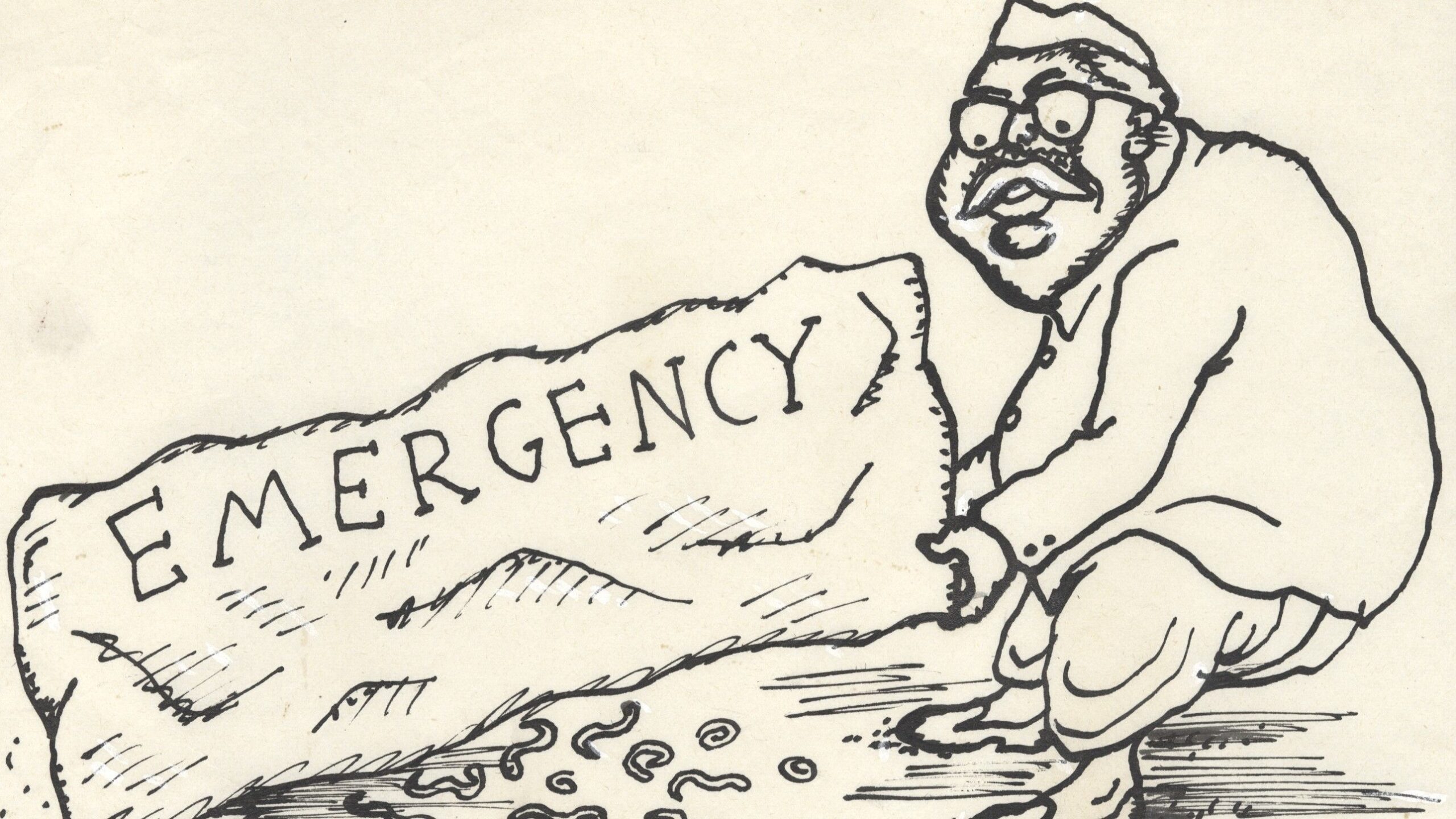Indian Cartoonist Defies Censorship with Humor and Resilience

Abu Abraham, a renowned political cartoonist, is remembered for his sharp and satirical commentary during India’s tumultuous Emergency period from 1975 to 1977. His work poignantly captured the media’s struggles under censorship imposed by Prime Minister Indira Gandhi’s government. As India grapples with ongoing concerns regarding press freedom, Abu’s cartoons remain a powerful reminder of the importance of independent journalism and the role of satire in political discourse.
Abu’s Impact During the Emergency
Abu Abraham’s cartoons from the Emergency era are celebrated for their incisive critique of power and authority. On June 25, 1975, the Indian government imposed strict censorship, silencing the press and curtailing civil liberties. In this oppressive environment, Abu’s work stood out as a beacon of resistance. One of his notable cartoons depicted a man questioning another about editors who were “more loyal than the censor,” highlighting the complicity of some media figures during this dark chapter in Indian history. His ability to blend humor with poignant political commentary resonated with many, making his cartoons timeless reflections on the state of press freedom.
Despite the challenges, Abu’s work flourished. He produced iconic pieces that illustrated the absurdity of the situation, such as a cartoon showing President Fakhruddin Ali Ahmed signing the Emergency proclamation from a bathtub, symbolizing the casual disregard for democratic norms. His cartoons often bore the stamp “Not passed by censors,” a bold statement against the government’s attempts to control the narrative. Through his art, Abu not only entertained but also provoked thought and discussion about the state of democracy in India.
The Legacy of Abu’s Cartoons
Abu’s return to India in the late 1960s marked the beginning of a prolific period in his career. After years of drawing cartoons for prominent British publications like The Observer and The Guardian, he joined the Indian Express as a political cartoonist. His work during the Emergency was characterized by a fearless approach to satire, often targeting figures like Sanjay Gandhi, who wielded significant power during this time. Abu’s ability to capture the essence of political absurdity through humor made his cartoons not just relevant but essential for understanding the political landscape of the era.
His cartoons often addressed the manufactured positivity propagated by the government, as seen in a piece where a man holds a placard reading “Smile!” while his friend quips about the government’s enforced cheerfulness. This clever use of humor to critique the state of affairs showcased Abu’s unique talent for blending wit with serious commentary. His work continues to resonate today, as India faces ongoing challenges related to media freedom and the space for dissenting voices.
Abu’s Career and Contributions
Born in Kerala in 1924, Abu Abraham began his career as a reporter before transitioning to cartooning. His early experiences during India’s struggle for independence shaped his understanding of the press’s role in society. After moving to London, he quickly gained recognition for his political cartoons, eventually returning to India to engage with the country’s complex political landscape. His tenure at The Observer and The Guardian allowed him to refine his craft, and he became known for his insightful and often humorous takes on current events.
Throughout his career, Abu maintained a commitment to creative freedom, often reflecting on the relationship between humor and politics. He believed that everything controversial was inherently political, and his work often challenged the status quo. Beyond cartooning, he served as a nominated member of India’s upper house of Parliament and created the comic strip “Salt and Pepper,” which ran for nearly two decades. His legacy is not just in the laughter he evoked but in the deeper truths his humor revealed about society and governance.
The Relevance of Abu’s Work Today
Abu Abraham’s cartoons remain relevant in today’s context, especially as India ranks 151st in the World Press Freedom Index. Critics argue that media independence is under threat, with increasing pressure on journalists and a shrinking space for dissent. While the government asserts that the media is free and vibrant, many believe that the challenges faced by journalists today echo the struggles of the Emergency period. Abu’s work serves as a reminder of the vital role that satire and independent journalism play in a healthy democracy.
His reflections on the state of humor during the Emergency resonate with contemporary audiences, as he noted the decline in genuine laughter amid political oppression. Abu’s ability to blend absurdity with truth in his cartoons continues to inspire new generations of artists and journalists. As India navigates its current political landscape, the lessons from Abu’s life and work remain crucial for understanding the importance of press freedom and the power of satire in holding authority accountable.
Observer Voice is the one stop site for National, International news, Sports, Editor’s Choice, Art/culture contents, Quotes and much more. We also cover historical contents. Historical contents includes World History, Indian History, and what happened today. The website also covers Entertainment across the India and World.
Follow Us on Twitter, Instagram, Facebook, & LinkedIn

